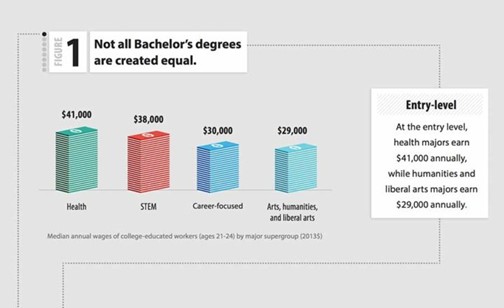The price of a college education has grown considerably in the last few decades. Why? That’s a different question for a different time. Is a college education still worth the cost? That’s yet another question for another time. We want to explore a different question: which college majors make the most financial sense?
There are millions of Americans who possess a college degree, and we’re willing to bet that each person’s college experience was unique. For this post, we’ll put aside the non-financial reasons people pursue a degree—intellectual discovery, rite of passage, collegiate athletics, etc.—and focus solely on the numbers. In this case, we want to look at the earnings potential of various college majors.
Unsurprisingly, not all college majors are valued equally in the marketplace. Why is this a valid topic to explore? Well, tuition costs the same for all majors, regardless of future earnings potential, so it’s fair to analyze the future value of a college degree, not just its cost.
Out of 137 college majors, there are vast differences in their economic value. Here are four key points:
- The top-paying college majors earn $3.4 million more than the lowest-paying majors over a lifetime.
- STEM (science, technology, engineering, and mathematics), health, and business majors are the highest
paying, leading to average annual wages of $37,000 or more at the entry-level and an average of $65,000 or more annually over the course of a recipient’s career. - Two of the top highest paying majors, STEM and business are also the most popular majors, accounting for 46 percent of college graduates.
- The 10 majors with the lowest median earnings are: early childhood education ($39,000); human services and community organization ($41,000); studio arts, social work, teacher education, and visual and performing arts ($42,000); theology and religious vocations, and elementary education ($43,000); drama and theater arts and family and community service ($45,000).

Source: https://cew.georgetown.edu/cew-reports/valueofcollegemajors/
Whether or not a college education is still “worth it” goes beyond future economic value. But the rapid increase in the cost of college has given some people second thoughts about enrolling. We hope this information helps inform you of the vast difference in what a “college degree” is worth in 2022, at least financially. For further information on this topic, we highly recommend this study from Georgetown University.
Multnomah Group is a registered investment adviser, registered with the Securities and Exchange Commission. Any information contained herein or on Multnomah Group’s website is provided for educational purposes only and does not intend to make an offer or solicitation for the sale or purchase of any specific securities, investments, or investment strategies. Investments involve risk and, unless otherwise stated, are not guaranteed. Multnomah Group does not provide legal or tax advice.

